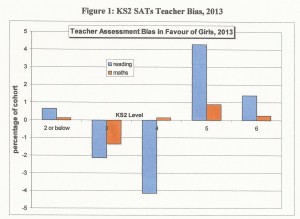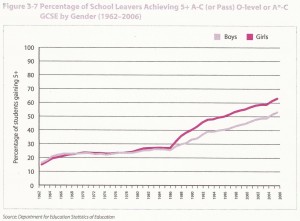The trouble with boys’ under-achievement in education is well known. Is it really a trouble with boys, or instead a trouble with teachers or a biased pedagogy? Some simple research is presented here which reveals interesting features in UK educational attainment data which are not conveyed by accounts of the issue in the media.
Let’s start with primary school SATs, of which Key Stage 2 (KS2), taken at age 11, is the most interesting. The 2013 KS2 SATs results for all schools in England can be downloaded in Excel format from Ref.[1]. The file also contains historic SAT data from 2007 onwards. Results for the whole of England are expressed in the form of the percentage of the cohort attaining a given SAT level. In two subjects, reading and maths, SAT results are given both for tests and also for teachers’ assessments. By subtracting the test result from the teacher assessment, say for girls, a measure of teacher error for the girls is obtained. Subtracting the teacher error for boys from the teacher error for girls gives a measure of teacher bias, i.e.,
Teacher Bias = (Agirls – Tgirls) – (Aboys – Tboys)
where A refers to the teacher assessment and T to the test result. A positive bias implies a tendency for the teachers to over-estimate the girls’ test scores more than they over-estimate the boys’ test scores (or to under-estimate the girls’ scores less than they under-estimate the boys’ scores). A negative bias is the reverse, i.e., in favour of boys. For 2013 the bias for each SAT level is shown in Figure 1 below.
This indicates unambiguously a teacher bias in favour of girls. The proportion of girls placed in the higher attainment levels (5 and 6) was over-estimated by the teachers (relative to that for boys), and the proportion of girls in the lower attainment levels (3 and 4) was under-estimated. This is the case for both maths and reading, though it is more emphatic for reading.
This teacher bias is not unique to 2013. Figure 2, below, shows the teacher bias for each year from 2007, in the form of attainment at or above level 4, or at or above level 5.
In some cases there is zero bias. But whenever there is a bias it is always in favour of the girls (i.e., always positive). These observations do not mean that the gender gap in performance is not real. Based on test scores alone, girls outperform boys in literacy skills, whilst boys outperform girls in maths. Nevertheless, it is concerning that a teacher gender bias is so readily apparent in the data. It is apposite to recall that 86% of primary school teachers in England are women, as are 96% of teaching assistants (Ref.[2]). Whilst this is not usually admitted, many people suspect that secondary schools use the KS2 SAT results as the basis of their initial streaming. Consequently it is possible that the teacher assessments have a bearing on a pupil’s subsequent advantage or disadvantage at secondary school.
Gender bias in favour of girls by primary school teachers has already been reported in the USA, Ref.[3]. To appreciate the Abstract of Ref.[3], quoted below, you need to understand what is meant by the term “non-cognitive development”. This is defined as attentiveness, task persistence, eagerness to learn, learning independence, flexibility and organization. To be more blunt, these phrases mean “well behaved”. To be even more blunt, they mean “behave like girls”. Ref.[3] concludes,
We extend the analysis of early-emerging gender differences in academic achievement to include both (objective) test scores and (subjective) teacher assessments. Using data from the 1998-99 ECLS-K cohort, we show that the grades awarded by teachers are not aligned with test scores, with the disparities in grading exceeding those in testing outcomes and uniformly favouring girls, and that the misalignment of grades and test scores can be linked to gender differences in non-cognitive development…..Boys score at least as well on math and science tests as girls, with the strongest evidence of a gender gap appearing among whites. However, boys in all racial categories across all subject areas are not represented in grade distributions where their test scores would predict. Even those boys who perform equally as well as girls on reading, math and science tests are nevertheless graded less favourably by their teachers, but this less favourable treatment essentially vanishes when non-cognitive skills are taken into account…..White boys who perform on par with white girls on these subject-area tests and exhibit the same non-cognitive skill level are graded similarly. For some specifications there is evidence of a grade “bonus” for white boys with test scores and behaviour like their girl counterparts.
Simply put, the gender disparity in this US study is largely, and in some cases entirely, due to boys being marked down for not being girls.
Moving on to secondary education, a useful source is Ref.[4]. Figure 3, below, reproduces Fig.3-7 of Ref.[4] and is extremely revealing. It shows the percentage of the cohort, by gender, achieving 5 or more grade A-C GCSE passes, or O-level passes, against year from 1962 to 2006.
This graph shows very clearly that the gender gap occurred abruptly in 1987/88, the same year that O levels were replaced by GCSEs. The adoption of GCSEs also brought the introduction of coursework and continuous assessment for the first time. It is generally believed that girls do better than boys on coursework. Moreover, since teachers mark the coursework, this provided the opportunity for the first time for teacher bias to influence the attainment of candidates taking these exams. It is not possible from the data to determine if teacher bias plays a part in the origin of the gender gap in these examinations of 16 year olds. However, the coincidence between the timing of the start of the gender gap and the introduction of GCSEs, shown in Figure 3, taken together with the evidence of teacher bias in favour of girls at KS2, is sufficient cause for real concern.
Further independent support for the contention that boys’ underperformance at GCSE may be largely a result of the nature of these awards is obtained from the OECD 2006 Programme for International Student Assessment (PISA) study. Boys did better than girls on these PISA tests in both science and maths, though doing less well than girls in GCSEs in these same subjects taken just a few months later.
The gender gap apparent at GCSE may be the major reason for the subsequent gender gaps at A-level and university. For example, Ref.[5] concluded that,
“The difference in achievement at GCSE has been shown to be sufficient to explain the differences in higher education participation. What is more, there are strong indications that the nature of the GCSE assessment (and the nature of the teaching and curriculum that feed it) is part of the reason for the relatively poor performance of boys“.
One mechanism by which this occurs is that better performance at GCSE naturally leads to a greater percentage of pupils remaining in full time education post-16. Hence, this percentage increased markedly for both sexes after 1987/88 as a response to the improving GCSE performance after that date (Figure 3). By the same reasoning, the better GCSE performance by the girls would be expected to lead to more girls remaining in full time education post-16 than boys. This is indeed the case, the participation fraction being 72% and 82% for males and females respectively (2005 data, Ref.[4]).
However, it is not only in numbers that women are outstripping men, it is also in terms of performance at A-level. In almost every subject women outperform men as regards the percentage attaining an A grade, the difference being up to ~10% (Ref.[4]). Even in physics, that bastion of maleness, women outperform men as regards the percentage of candidates attaining an A grade – by 8%. However, just as with KS2 SATs and GCSEs, there are some indications that gender bias exists also within the A-level process. For example, Ref.[6] reported a study comparing A-level performance with a SAT type test for 17/18 year olds. It concluded that,
“Female students had higher total GCSE and A level points scores and achieved significantly higher scores on the SAT Writing component than male students. Male students performed significantly better on the SAT Mathematics component and on the SAT as a whole. There were gender differences in the relationships between SAT scores and A level grades in favour of male students“.
In other words, the gender disparity at A level may also be due in part to the particulars of the award process. This adds further fuel to the suggestion that the gender gap might be a product of bias and/or feminisation of the UK schooling and exam system.
Finally, at university level, the salient facts are as follows (taken from Ref.[5]). The annual number of women graduates now exceeds the annual number of men graduates by 32% (2012 graduates were 43% men and 57% women). Female dominance of higher education applies across every class of institution. In 2008, 56% of graduate jobs went to women. Current graduate figures suggest that in the near future we can expect ~60% or more of doctors, lawyers and journalists to be women, and ~77% of vets and teachers to be women (the latter being virtually the case already). Women postgraduates outnumber men postgraduates by nearly 60% (the participation rates being 11% and 7% respectively). University staff in the UK are 54% women and this dominance by women is likely to increase considerably in view of the female:male postgraduate ratio.
It is desperately distressing that despite this near-universal educational disadvantage of males, there is no effective action being taken to combat it. A National Foundation for Educational Research report, Ref.[7], frankly admits that,
“Strategies to improve gender balance have been put in place in relation to certain subject areas only……..some centrally funded interventions related to strategically important subjects including STEM subjects (science, technology, engineering, mathematics). Of these, the London Engineering Project intends to widen and significantly increase participation in engineering in higher education for four target groups: women, minority ethnic students, students from families where there is no experience of higher education, and adult learners. The programme includes a strand targeting Afro-Caribbean boys and Bangladeshi and Pakistani girls…..The WISE campaign collaborates with industry and education to encourage UK girls of school age to value and pursue STEM or construction related courses in school or college, and to move on into related careers.
So, despite the educational disadvantage of males, only one thing has been done and that is aimed primarily at further promoting the advantage of women.
In conclusion, Ref.[5] offers the following observations,
“In the same way as the relatively poor performance of females previously gave rise to concerns that large numbers were being excluded from the benefits that follow from fulfilling their potential, so the same concerns now arise in respect of males. The important thing is to recognise the issue: changing a mindset that continues to see males as advantaged and females as disadvantaged. It is certainly unacceptable to suggest, as was recorded in Ref.[4], that, “it could be argued that the widening gender gap in educational achievement does not matter if this advantage either disappears by the time the girl enters the labour market or if it helps to ensure greater equality for women in the labour market” implying that male educational disadvantage may be acceptable because there is female disadvantage in the workplace. It does not help one disadvantage to perpetuate another. For some, there is no problem with such a scenario. As one of the contributors to the Times Higher Education discussion put it: “…if the boys don’t want to get educated, why not let them play football while the more intelligent sex gets on with running the world.” If this is also the view of those professors of education and policy makers who think there is no cause for concern, then they should argue this, and perhaps try to anticipate the changes in society that would result. For our part we concur with the recent OECD report that concluded that…..the ideal of equality remains preferable.”
References
- https://docs.google.com/spreadsheet/ccc?key=0AonYZs4MzlZbdHl4T0xCWlcyeGg1M1JmNDZDbTdWZ1E&usp=sharing#gid=2
- “School Workforce in England”, November 2012, https://www.gov.uk/government/publications/school-workforce-in-england-november-2012
- C.M.Cornwell, D.B.Mustard and J.Van Parys, “Non-Cognitive Skills and the Gender Disparities in Test Scores and Teacher Assessments: Evidence from Primary School”, IZA Discussion Paper No. 5973, September 2011.
- Department of Education & Skills’ report, “Gender and Education: the Evidence on Pupils in England”, 2007.
- Higher Education Policy Institute, “Male and Female Participation and Progression in Higher Education”, 2009 plus 2010 supplement, http://www.hepi.ac.uk/wp-content/uploads/2014/02/48-Gender-further-analysis-full.pdf
- C.Kirkup, J.Morrison and C.Whetton, National Foundation for Educational Research report “Relationships between A level Grades and SAT Scores in a Sample of UK Students”, paper presented at the Annual Meeting of the American Educational Research Association, New York, March 24-28, 2008.
- National Foundation for Educational Research report “Gender Differences in Educational Outcomes: England”, June 2010, http://www.nfer.ac.uk/shadomx/apps/fms/fmsdownload.cfm?file_uuid=67EB886D-C29E-AD4D-00A3-6752B523AE2E&siteName=nfer.



